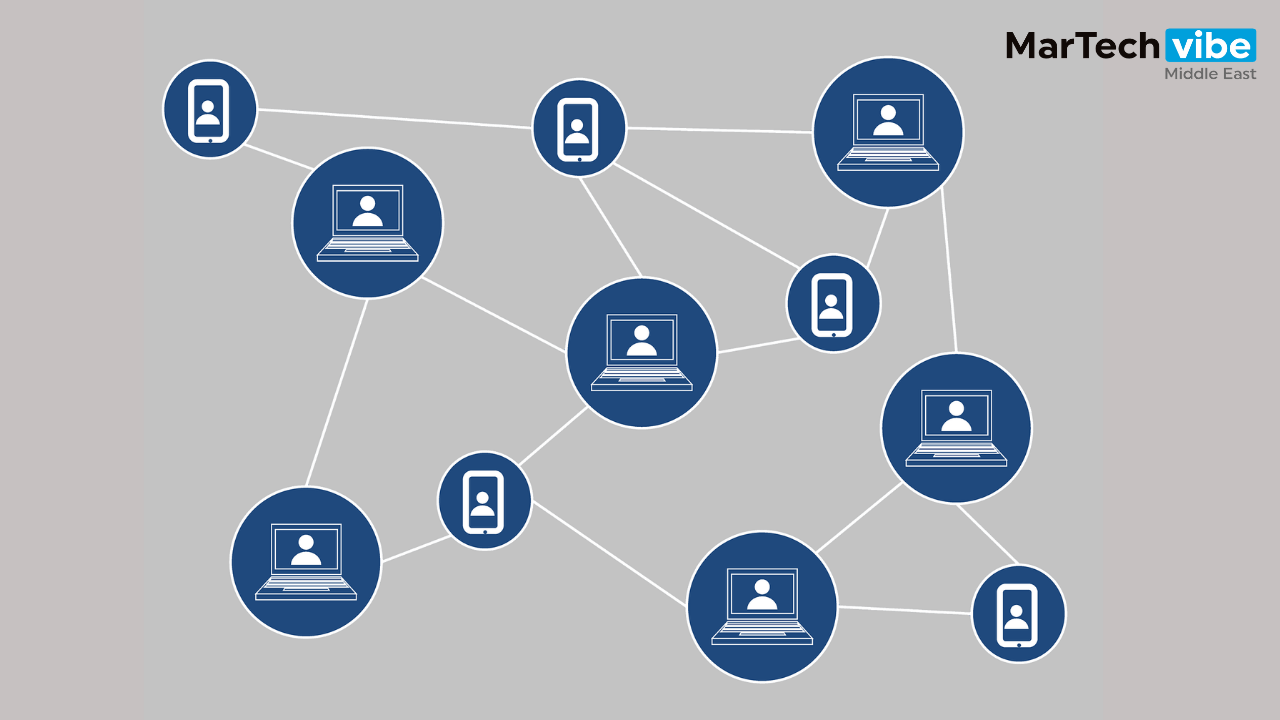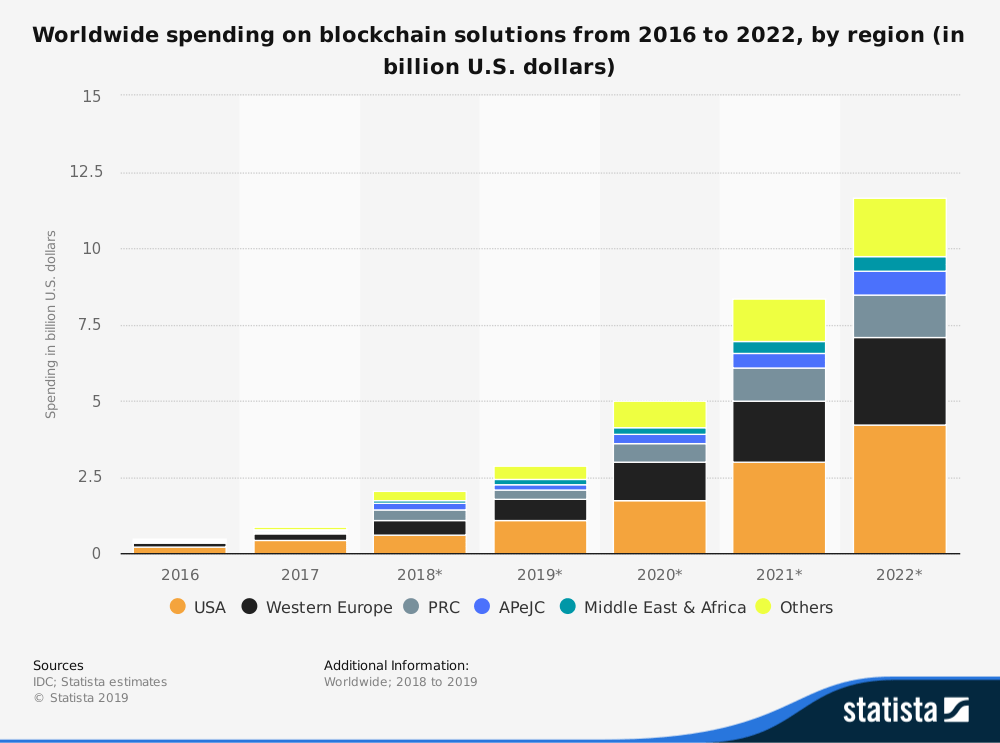It takes a great deal for technology so nascent to become an indispensable tool for businesses. Within a decade, Blockchain has proven itself as a key player in the global economy that can achieve tangible business outcomes. Lately, Middle East too has risen to the challenge of adopting Blockchain in its mainstream marketing efforts.
The Middle East entered the mainstream blockchain implementation in 2018, and in the coming years, blockchain is expected to pave its way deeper in the markets with a significant contribution. According to Statista, the Middle East’s spending on blockchain solutions will reach USD 0.5 billion by 2022.
Back in April 2018, the UAE government introduced the Emirates Blockchain Strategy with an aim to capitalise on this multi-billion-dollar opportunity. This strategy would empower 50 per cent of the government monetary operations with blockchain technology by 2021. The roadmap emphasises on reducing manual operations to save time (77 million working hours), resources (398 million printed documents) and money (AED 11 billion in transactions).
Also Read: Marketing Automation Becomes Necessary to Achieve an Omni-channel Experience
Five Examples of Using Blockchain in Marketing
The establishment of a number of blockchain businesses has positioned UAE as an innovation hub. According to the Dubai Multi Commodities Centre (DMCC) reports, the investments in the blockchain is estimated to reach USD 300 billion.
- Last year, many B2B seafood brands were accounted for mislabelling during the supply chain. Seafood Souq, a blockchain-based start-up, ensured the traceability of fresh seafood throughout the journey, from the point of fishing to the shops. By doing so, the brand managed to raise the investment worth AED 2.5 million.
- Wemark, another Middle East-based blockchain-powered platform, offers professional photographers or businesses to have absolute control of their content. Based on Ethereum blockchain, the platform serves the photography businesses to market services directly to their consumers without the intervention of third parties. Using Wemark platform, individual photographers can make a profit of up to 85 per cent as royalty and eliminate the intermediaries that previously took a large chunk of the revenue. The end-to-end transactions are executed using Wemark’s native token (WMK) via smart contract. By the mid-2018, Wemark had successfully raised USD 1 million.
- Another Middle Eastern blockchain initiative, Proof Work has emerged as one of the successfully funded healthcare and life science services. Its decentralised ledger system connects the doctor, patient, hospital, insurers, pharmaceuticals and healthcare providers. The network so built helps the doctor to access medical history, prescribe medications and diagnosis to the patient in a time-effective manner. The service utilises a decentralised application (Daaps) to establish secure and transparent medical processes. It serves the patient an easy way to reach doctors, go through medications or find insurers. The startup has raised total funding of USD 215,000 so far.
- Egypt managed to show off its innovative ride-hailing service and as the first blockchain-based transportation in the country. Also dubbed as the ‘Uber’ of Egypt, RedCab facilitates P2P transaction between passengers and drivers. The transaction is carried out using RedCab’s native token via a decentralised application. Despite the low population density, RedCab’s Chief Business Officer Walid El Gendy envisioned to offer a brand new cab service that could help fill the transportation gap in the country. “We studied the market for a year and saw huge potential in the blockchain. First, it hasn’t been penetrated yet; no transportation startup actually entered into the blockchain field. The question was how we could tailor a business model that suits the blockchain, make the community grow, create a community and get profitability,” he noted.
- Gaming is another space that has begun leveraging blockchain. RadMule Labs took this opportunity to connect with the community and gave them the freedom to use the product without the game studio’s interference. RadMule Labs CEO Ulas Bilgenoglu explains how its tokenised in-game purchases can transform the gaming experience: “In a game economy, everything is usually transacted in the economy inside the game, but with blockchain and digital assets, users can transact outside of the game economy.”
The platform not only provides a whole new experience of moving, buying, trading, and selling the in-game assets but also helps in provenance and ownership of monetary values and virtual items. Gaming industry promises to pour in heavy investments into the right markets.
Also Read: Boosting Sales ROI With an Analytics-based Strategy
The Benefits of Blockchain in Marketing:
1. Establishing Trust with AdTech:
Agencies have been accused of using bots and fake profiles to acquire the desired numbers for a successful campaign. However, blockchain being a peer-to-peer connection, it’s practically impossible to use fake IDs or bots, paving the way for more trustworthy campaigns.
2. No Intermediaries:
Blockchain marketing allows marketers to bid farewell to platforms like Amazon affiliate, which end up taking a big chunk of our success pie. In the blockchain, an organisation’s credibility is already proven by the node participants that allow them to perform transparent business.
3. Improve Transparency:
In the immutable ledger, you’re going to have all your information in the chain. Most importantly, you can use that verify your claims. Not only businesses but governments would rely on this single source of truth. This will eliminate fraudulent practices and provide provenance.
4. Implementation of Dapps:
Decentralised applications will not only reduce third-party interference but also eliminate the time-consuming processes such as invoice generation during payment processes. Also, a smart contract feature facilitates hassle-free payments and maintains transactional records for both the parties.
Also Read: How Location Analysis Helps Data-driven Marketers
Blockchain Set to Change Digital Marketing
With blockchain, marketers can take the next step towards personalisation. As blockchain can link all transactions and online behaviours specific to each customer, it can provide marketers with a robust profile for each customer, thereby helping marketers to personalise their offering to that customer. With its huge potential in marketing, blockchain will help revolutionise the way marketers are deploying, consuming, and understanding marketing campaigns as a whole. It can truly help change the world of digital marketing as we know it.










